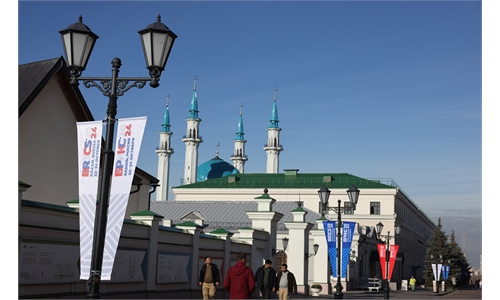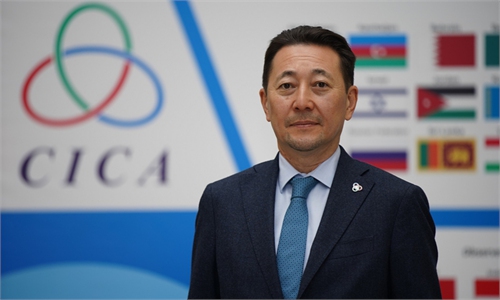
Posters for the 16th BRICS Summit are displayed in Kazan, Russia, on October 22, 2024. Photo: VCG
Editor's Note:
The 2024 BRICS Summit is being held from Tuesday to Thursday in Kazan, Russia. It is the first summit after the bloc's expansion. What should we expect from this gathering? What are the reasons behind the surging willingness from more and more countries to join the BRICS mechanism? The Global Times (GT) invited experts from countries that are either members of BRICS or interested in researching this grouping to share their insights.
In the third of this series, Boris Volkhonsky (Volkhonsky), an associate professor at the Institute of Asian and African Studies at Lomonosov Moscow State University, interpreted the multiple meanings of "Greater BRICS" and the role of BRICS countries in global governance and economic cooperation.
GT: What are your expectations for this summit?
Volkhonsky: It is the first leaders' meeting since the expansion in January, and I believe that BRICS will continue to expand.
I think these developments are significant not only for BRICS member states but also for global governance. The expansion opens routes for new regions that were not previously included in the BRICS format. BRICS is becoming increasingly attractive to the whole world, regardless of the regions those countries belong to.
I think this is a real new arena for the world to discuss global problems in a format without the dictatorship of any particular group, namely the collective West. It is based on new principles where horizontal links between countries play a more important role. This represents a truly new start for global dialogue.
GT: The BRICS cooperation mechanism has entered the "Greater BRICS" era. How do you interpret the multiple meanings of "greater"?
Volkhonsky: First of all, apart from the countries that are already members, at least 30 have expressed a strong desire to join the format. This already makes it "greater." It would be useful to develop a mechanism which includes full members, candidate members and dialogue partners. Perhaps we should establish specific stages for applying to BRICS, as different countries have varying levels of economic development and may hold different views on global issues.
Second, BRICS unites countries such as China, Brazil, Russia, India and South Africa. Each of these countries is a leader in its region. Existing formats of cooperation already exist in each of these regions. For example, the Eurasian Economic Union involves Russia, while the Shanghai Cooperation Organization brings together Russia, India and China, along with other countries. In Latin America, there is MERCOSUR, and in Africa, we have the African Union, among others. With these regional leaders, they can serve as gateways to their wider regions. Therefore, it may be beneficial to combine the existing cooperation formats in each region with BRICS, making it a more influential and positive factor for development.
GT: How do you see BRICS countries playing a role in global governance and in protecting the common interests of emerging market countries and developing nations?
Volkhonsky: BRICS does not have a hierarchical structure or bureaucracy. There is no dictatorship of one power over others. All decisions are made through consensus.
In addition to political influence, it is crucial to create mechanisms for economic cooperation. Countries like Russia, China, India and Iran are part of Greater Eurasia, but when we look at economic collaboration, we find numerous contradictions and competitive factors among them. Economic cooperation is likely the weak point within BRICS. Therefore, much more attention needs to be focused on this area.
In this regard, BRICS can serve as a unifying mechanism to bring together regional formats, such as ASEAN, which is one of the most dynamically developing organizations and regions globally. Currently, no ASEAN country is a member of BRICS, but perhaps it's time to consider this. Enhanced cooperation and integration among economies should be our primary focus. If we concentrate solely on political issues, it may bring issues from countries outside of BRICS and fail to create a fruitful and constructive atmosphere.
GT: What challenges do we face in exploring cooperation paths for the Global South? What can we do to address these challenges?
Volkhonsky: It's time to increase the voice and importance of the Global South. When we compare BRICS to the G7, it's clear that BRICS has long surpassed the G7 in economic terms.
However, its economic power has not yet been fully translated into political influence. With the expansion of BRICS and increased integration with other formats, we have the opportunity to challenge the monopoly of the so-called collective West and to enhance the authority of non-Western powers.
GT: Some Western media outlets have exaggerated the "military alliance tendencies" of BRICS, claiming BRICS will become a "NATO of the Global South." How do you respond to this view?
Volkhonsky: In my view, there is no reason to believe that BRICS will become a "NATO for the Global South." I think it is a principal policy of both China and India not to engage in military alliances with external forces. When Western media discuss the potential for military alliances within BRICS, it is merely a cover-up to hide their own objectives. They project their aspirations onto other countries.
If we examine the actual activities in various regions, we see that it is the West that is forming military or semi-military alliances, such as AUKUS, which exhibit an aggressive and distinctly anti-China stance.
There has also been discussion about expanding NATO's influence into East Asia, including Japan and South Korea.
GT: What contributions has China made to the BRICS cooperation mechanism? How do you see China injecting new momentum into the "Greater BRICS" era?
Volkhonsky: I believe that China, as one of the co-founders of BRIC - originally consisting of Brazil, Russia, India and China - is a leading economy and an emerging political force. China is the leading economy in terms of purchasing power parity, ranking as the No.1 economy in the world. This status makes it increasingly attractive to many countries. Its far-reaching initiatives, like the Belt and Road Initiative, have drawn interest from numerous nations, extending well beyond East Asia to include some Western and Southern European countries. China is undoubtedly one of the poles in our globalizing world, becoming increasingly appealing to other nations.



